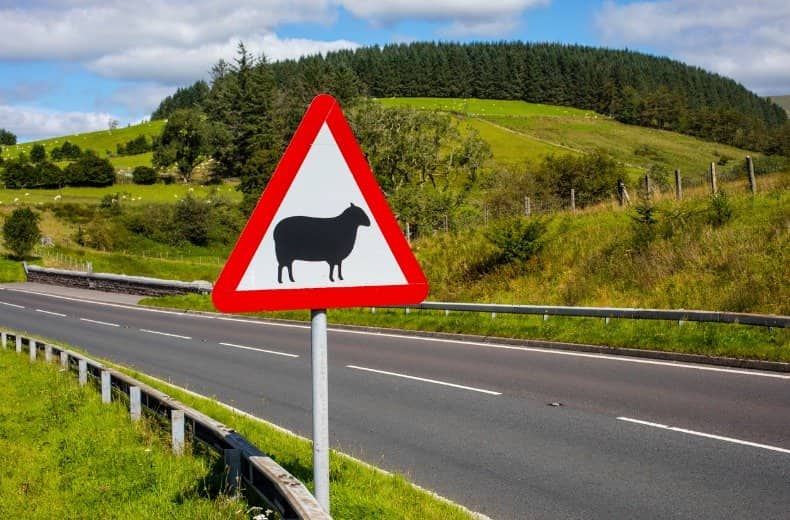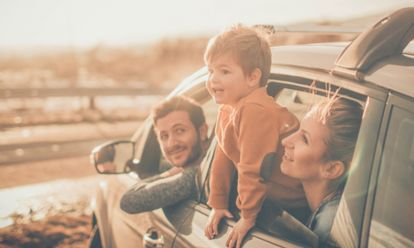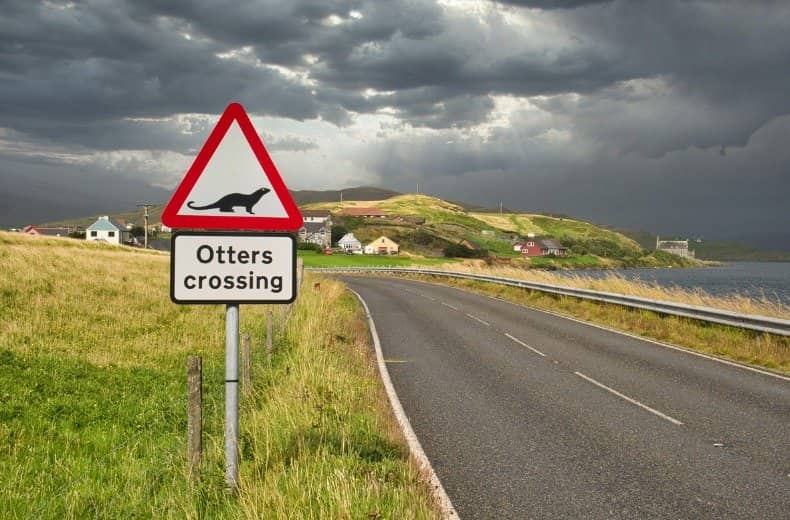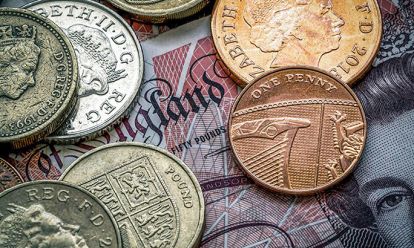Read on for our driving advice on what to do and who to call if you hit any animal with your car.
What to do when you hit an animal
If you hit an animal with your car you should turn your hazards on, stop the car as soon as it’s safe to do so and switch off the engine.
Check yourself and any passengers for injuries and exit the car safely.
If you hit any of the following animals you’ll need to tell the police:
- dogs
- horses
- cattle
- pigs
- goats
- sheep
- donkeys and mules
Watch the animal from a safe distance to see if it’s injured. If you think it might be, call one of the following:
- RSPCA (England and Wales) on 0300 1234 999
- Scottish Society for the Prevention of Cruelty to Animals (Scotland) on 03000 999 999
- Ulster Society for the Prevention of Cruelty to Animals (Northern Ireland) on 028 3025 1000
Injured animals might become aggressive if they’re hurt or frightened, so think carefully before you approach them. You should wait until the police and/or animal charity arrive to give them your details.
Is it illegal to hit an animal and drive away?
Yes. You have to tell the police if you hit any of the animals mentioned above.
Although this means you don’t have to report every accident, you could help to save the life of a badger, fox or other small animal if you report the incident to the RSPCA (England and Wales), the SSPCA (Scotland) or the USPCA (Northern Ireland).

Cheaper than AA or we’ll beat by 20%^
• Roadside cover from £5.49 a month*
• We get to most breakdowns in 60 mins or less
• Our patrols fix 4/5 breakdowns on the spot

What should I do if an animal is dead on the road?
You should always report a dead animal on the road to your local council.
If you can safely move the body to the side of the road to prevent obstruction and further accidents you can do so.
What should I do if I hit a pet cat or pet dog?
If you hit someone’s pet you’ll need to consider the owner as well as the animal.
First, check your immediate surroundings for the owner. If they’re near the scene of the accident they may be distressed, so you should try to stay calm and share your details with them.
If you hit a dog you’ll need to call the police. Unfortunately for their owners, if you hit a cat you don’t need to do so.
If the owner is nowhere to be seen, try looking for contact details on the animal’s collar. Explain to the owner what’s happened to their pet and offer them your contact details.
If the owner isn’t nearby or if there are no contact details on a collar, the RSPCA might be able to check the animal for a microchip to trace the owner.
Read our advice for what to do if your dog has been hit by a car.
- Travelling with your dog in the car - do's and don'ts
- Pets and breakdowns - what you need to do
- What to do if your dog has been hit by a car
What should I do if I hit a farm animal?

You should contact the police if you hit any farm animals.
The owner of the livestock may be held liable for an accident depending on the circumstances, such as leaving a gate open.1
How does hitting an animal affect your insurance?
It’s always best to let your insurance provider know about any accident involving an animal. The terms of your insurance might require you to log an accident even if you don’t intend to make a claim.
If you do make a claim you may be covered for damage to your car or for any injuries. However, you could lose your no claims bonus if it’s not protected.
Can I claim it was the animal’s fault?
In accidents with a farm animal or somebody's pet your insurer may decide that the animal’s owner was at fault.
Wild animals aren’t ‘owned’ by anybody so your provider may decide that no one was liable for the accident.2
Am I liable if I have an accident when trying to avoid an animal?
If you slam on the brakes or swerve out of your lane to avoid an animal and hit another car, you may be at fault for the accident. This is generally decided on a case-by-case basis.
5 Star Defaqto rated cover
RAC Comprehensive Car Insurance Plus has been given a 5 Star Rating by Defaqto. Get a quote online today.



Collisions with deer - what to do? And should you report it?
The British Deer Society (DVS) reports that road traffic accidents involving deer are a significant issue in the UK, as well as in many other European countries.
While precise statistics are unavailable, it is estimated that the annual number of deer killed or injured on UK roads could exceed 40,000, potentially reaching as high as 74,000.
The DVS report shows that there is a minimum of 115 vehicle collisions with deer every day. And one to two of these will lead to serious injury or even death of the person involved.
What should you do if you hit a deer when driving?
If you hit a deer while driving, here’s what you should do:
- Pull over and be safe: First, check your surroundings to ensure it’s safe to stop. If possible, pull over to the side of the road or a safe area.
- Turn on hazard warning lights: Make your vehicle visible to other drivers by turning on your hazard lights to prevent further accidents.
- Check for injuries: If the deer is still alive and moving, it may be in pain and could pose a danger to you or other drivers. Keep your distance, as injured animals may behave unpredictably.
- Call the police: Contact the police to report the incident. They will assist with handling the situation, including removing the animal or dispatching someone to assist if it’s still alive. Do not approach or touch the deer.
- Document the incident: Take photos of any damage to your vehicle, the position of the deer (from a distance), and the surrounding area. This can be useful for insurance claims or legal matters.
- Check for vehicle for damage: Assess the damage to your car and make sure it’s safe to continue driving. If your vehicle is unsafe to drive, call your breakdown provider.
- Contact your insurance provider: Notify your insurance company about the incident, especially if there’s damage to your vehicle.
Should you inform your car insurance provider?
Most insurance policies mandate that you report any accident or incident, even if you don’t plan to file a claim. Not reporting the incident could impact your coverage.
This is because if you choose to file a claim for the damage, you must notify your insurer promptly to begin the claims process with all the relevant details.
Reporting the incident creates a record of the event, which can be useful if further issues occur.
Do I need to report a collision with a deer to the police?
While there is no legal obligation to report hitting a deer to the police, it is strongly recommended to do so if the animal is on or near the road. In such cases, you should inform them of the incident.
The authorities will then coordinate with wildlife specialists or other relevant services to safely remove the deer from the road, helping to prevent further accidents or disruptions to traffic.
Reporting the incident also ensures that proper steps are taken to handle the situation and manage any potential risks to public safety.
When are you most likely to see deer on UK roads?
According to The British Deer Society, deer vehicle collisions are most common from October to December and again in May.
However, it's important to keep in mind that deer can be encountered on the road at any time of the year.

Cheaper than AA or we’ll beat by 20%^
• Roadside cover from £5.49 a month*
• We get to most breakdowns in 60 mins or less
• Our patrols fix 4/5 breakdowns on the spot

How to avoid hitting an animal in future
There a few things you can do to reduce your chances of hitting an animal:
Look out for road signs

Road signs showing cattle, deer and horses are used to warn drivers about their chances of encountering animals on the road. Keep an eye out for the signs at all times.
Watch your speed
Sticking to speed limits will reduce your chances of hitting animals no matter where you’re driving. On residential roads for example, dogs may be off their lead near parks and foxes tend to dart across the road late at night. Watching your speed will give you the best chance of reacting in time to avoid a collision.
Use lights at night
Your headlights let animals know they should take extra care. Electric and hybrid cars have quieter engines than traditional internal combustion engine (ICE) cars so animals are less likely to hear them approaching. There’s never been a greater need to use your headlights, especially on rural roads.
Keep your distance
It’s always been a golden rule of the road but keeping your distance, especially in areas where animals are common, could make the difference between hitting a wild animal or an accident-free journey.
Get 30 driving tips that will save you money
Running a car isn’t cheap, but there are some easy things you can do to keep your costs down. Get these tips and more useful driving articles sent straight to your inbox now.


Get a service or repair at home
RAC Mobile Mechanics can come to you, saving you the hassle of going to a garage.















